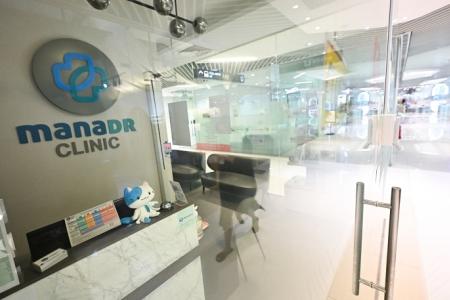MaNaDr lapses a wake-up call to maintain ethical standards
Issues at MaNaDr Clinic flagged by the health authorities have served as a wake-up call for the telemedicine sector on the importance of good clinical practices, said telehealth players.
The clinic’s doctors were found to have conducted teleconsultations of less than a minute, issued multiple medical certificates (MCs) within a short period such as 30 days, and maintained extremely sparse patient case notes.
The incident has impacted public trust in telehealth, said telehealth provider Doctor Anywhere, citing this as a reason for the slight dip in business since news about the case broke in August.
On Oct 24, the Ministry of Health said it intends to revoke MaNaDr Clinic’s licence for providing outpatient medical services physically, remotely and at temporary premises such as patients’ residences.
Dr Andrew Fang, director of medical affairs at Doctor Anywhere, said the MaNaDr Clinic case has underscored that not all healthcare providers share the same commitment to upholding ethics or the right approach in healthcare.
“While we have seen a slight dip in telemedicine adoption rates, we are confident in a recovery because telehealth continues to meet essential healthcare needs and plays a vital role in supporting Singapore’s healthcare system,” he said.
The platform, which started operations in 2017, has over one million users in Singapore.
Dr Shravan Verma, co-founder and chief executive of Speedoc, said that while such incidents raise concerns, a focus on comprehensive documentation and patient-centred protocols can reassure employers and patients of the value of telehealth services – especially during critical periods like the pandemic.
“Our team is well prepared to reinforce transparency by proactively supporting HR departments’ requests for employee MC verification,” said Dr Verma.
Speedoc has served approximately 180,000 patients since the telemedicine app was started in 2017.
Telehealth platforms The Straits Times spoke to said that to ensure doctors are abiding by ethical and healthcare standards, they have regularly conducted internal audits on consultation length, frequency and issuing of MCs.
Doctor Anywhere, Speedoc, Raffles Medical Group, Fullerton Health and Pinnacle Family Clinic said they have some form of digital medical records system that allows them to identify patients with multiple recent consultations. These patients will be recommended to go for an in-person consultation at physical clinics.
Dr Marcus Lee, medical director at Fullerton Health, said patients who have teleconsultations for the same condition at least three times in a month will be flagged in its system.
He said the health group, which has 27 physical clinics, conducts audits on the duration of the MCs given on its telemedicine platform, to prevent abuse of its services. “For the first nine months of 2024, 95 per cent of our unique patients have an average of one MC or less in a month,” he said.
The company launched its telehealth platform in 2020, and conducts an average of 650 teleconsultations a day.
Dr Mok Boon Rui, founder of Pinnacle Family Clinic, pointed out that while providers will know if a patient has been calling in frequently to request MCs on their platforms, things become more complicated if a patient clinic-hops.
Healthcare providers using the National Electronic Health Record (NEHR) repository of patient records can see if a patient has visited other healthcare providers that are also on NEHR. About 70 per cent of private clinics, excluding those providing aesthetic services, are on the system.
But information such as whether a patient has been given an MC is not available on the system. Dr Mok said it would be helpful for such information to be on the NEHR. “It’ll be the most obvious way to find out if a patient is a frequent MC-taker or not.”
Pinnacle Family Clinic has 17 physical clinics. Its telehealth app was launched in February 2020, and it facilitates an average of about 200 teleconsultations a day.
While industry players said there is no hard and fast rule to how long a teleconsultation should take, sessions under one minute are likely to be inadequate.
This is because doctors are expected to verify the patient’s identity, review their medical history, discuss any complaints or symptoms, and convey a clear treatment plan.
Raffles Medical’s deputy medical director Melvyn Wong and Pinnacle Family Clinic’s Dr Mok said that a thorough teleconsultation generally requires at least three to four minutes, depending on the patient’s needs and the complexity of the case.
Speedoc’s Dr Verma said that for common conditions like coughs and colds, consultations typically do not exceed five minutes.
Dr Mok said his company charges fixed rates for teleconsultations, ranging from $13.90 to $36.90 before GST depending on the time of the day, no matter how long a consultation takes. This helps guard against abuse.
This is unlike operators whose teleconsultation rates are affected by the length of a session.
“For example, if a platform charges you more for every minute, patients will tend to cut short the consultation. That’s something we do not want to have,” said Dr Mok.
Checks by ST found that MaNaDr Clinic’s charges start at $8.20 for online consultations. This includes one minute on video call, and five chat messages. There are charges for additional minutes and messages.
Fullerton Health’s Dr Lee said the company does not focus on a minimum duration for consultations.
“If duration is set as a metric (for monitoring), it may be easily manipulated. Staff on the ground may manipulate the figures or purposely leave the recording rolling. That’s why we focus on outcomes like quality of care, and whether our doctors and staff are well trained to conduct the teleconsult,” said Dr Lee.
Forty-one doctors who provided teleconsultations at MaNaDr Clinic will also be referred to the Singapore Medical Council for inquiries into possible professional misconduct.
Of these, 13 worked as locum practitioners at MaNaDr Clinic while being employed by public healthcare institutions or MOH Holdings. Doctors working for public healthcare institutions are not allowed to moonlight. Seven have been sacked.
Telehealth operators said they have limited avenues to verify if locums are moonlighting.
Raffles Medical and Pinnacle Family Clinic do not hire locums for telehealth work.
The other three operators said they require locums to provide their medical council registration (MCR) numbers, which can be used to confirm their credentials against a public registry. The registry includes information like a doctor’s primary place of practice.
This is in addition to information on their medical training background, licensing, and telemedicine experience, including proof of completing the mandatory Ministry of Health telemedicine e-training.
But while useful, the MCR is not a foolproof way of checking if a doctor working in a public healthcare sector is moonlighting, as the information is sometimes not updated.
Doctor Anywhere’s Dr Fang said the platform does not take applicants employed in public healthcare or those with potential conflicts of interest. It employs around 90 locum doctors, in addition to full-time doctors.
He added that telehealth platforms rely on full disclosure from doctors themselves, as they do not have direct access to employment records from public healthcare institutions.
Get The New Paper on your phone with the free TNP app. Download from the Apple App Store or Google Play Store now


